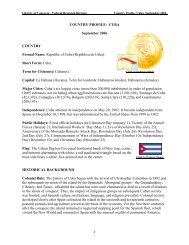1 - American Memory
1 - American Memory
1 - American Memory
Create successful ePaper yourself
Turn your PDF publications into a flip-book with our unique Google optimized e-Paper software.
226<br />
at tremendous cost, at 100 or 200 percent price increases over what<br />
they normally were before the strike. Both my parents were very se-<br />
verely affected. They were both retirees at that time living only on<br />
social security.<br />
Imagine wifiat these people had to go through during those 180-plus<br />
days when the strike was going on. These are some of the people with<br />
fixed incomes who have suffered most.<br />
Mr. KtTTKENDALL. There are some items that obviously can be air-<br />
lifted for reasons of extremely high value or very low volume. Every-<br />
one here has referred to toilet paper.<br />
There is one very simple reason that there is no way to airlift a<br />
product like that—space. It is too bulky. There are other items that<br />
are very, very heavy.<br />
I think the labor movement on the west coast and probably the Na-<br />
tional Councils of AFIJ-CIO have an instinctive fear that this is going<br />
to undermine the basic strength of collective bargaining in labor-<br />
management relations.<br />
Remember a few years ago there were attempted national airline<br />
strikes. We don't have those any more because organized labor and<br />
management and the Congress recognized the fact that we can not<br />
have a total paralysis. So now when there is a strike, it is selective<br />
and, therefore, will not affect the total economy.<br />
We are not going to have any more national rail strikes or national<br />
truck strikes.<br />
The railroad unions fought long and hard and finally won their case<br />
in the Supreme Court to have selective strikes because they recognized<br />
the Nation would not tolerate a national shutdown.<br />
What is happening to Hawaii has to be presented as the equivalent<br />
to a national strike which has come to be unacceptable stateside.<br />
Thank you, Mr. Chairman.<br />
Mr. DiNOELL. I think the gentleman from Tennessee has made a very<br />
good point. The Chair has observed, I would call, the considerable<br />
distress of the people of Hawaii during the last strike referred to in the<br />
testimony today. The Chair recalls at that point that the Congress did<br />
respond. We did meet the need. It was largely as a result of the leader-<br />
ship of the gentleman from Hawaii and Mrs. Mink that the Congress<br />
did respond.<br />
Both Mr. Kuykendall and I have participated in a number of pieces<br />
of legislation relating to labor-management problems. We regularly<br />
have rail strikes before us and we regularly have the airline strikes<br />
before us when they occur and this committee and the Congress have<br />
responded. I have not always supported the conclusions that the Con-<br />
gress or the committee came to, but we have always responded to the<br />
need to prevent these national transportation strikes or a strike which<br />
would close down an entire portion of the Nation's economy.<br />
I say that even though I have not always agreed with the deter-<br />
minations of the Congress. The Congress does respond and large seg-<br />
ments of the <strong>American</strong> labor movement have become aware, as the<br />
gentleman from Tennessee has so well pointed out, that these kinds of<br />
labor shutdowns and disputes between labor and management do have<br />
the result of bringing a national response with the demand that na-<br />
tional services do not terminate during these times when labor seeks



![Albert Einstein Papers [finding aid]. Library of Congress. [PDF ...](https://img.yumpu.com/21604228/1/190x245/albert-einstein-papers-finding-aid-library-of-congress-pdf-.jpg?quality=85)





![American Colony in Jerusalem Collection [finding aid]. Library of ...](https://img.yumpu.com/17941275/1/190x245/american-colony-in-jerusalem-collection-finding-aid-library-of-.jpg?quality=85)



![Piccard Family Papers [finding aid]. - American Memory - Library of ...](https://img.yumpu.com/17941234/1/190x245/piccard-family-papers-finding-aid-american-memory-library-of-.jpg?quality=85)


